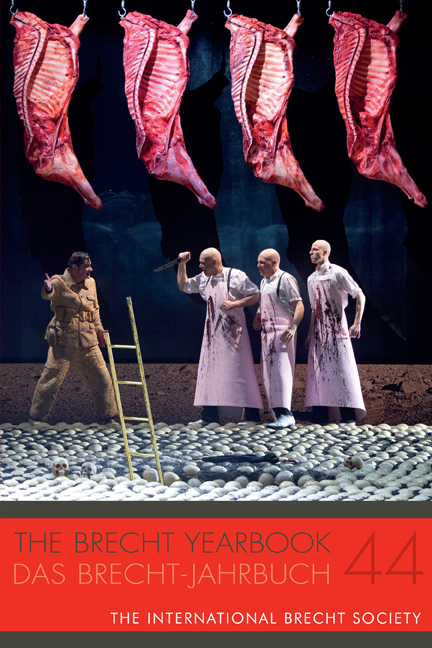Book contents
- Frontmatter
- Officers of the International Brecht Society
- Contents
- Editorial
- List of Abbreviations
- Brecht, Günter Kunert, and Edgar Lee Masters
- Brecht’s Dramatic Fragments
- Pure Joke: The Comedy of Theater since Brecht
- New Brecht Research
- Book Reviews
- Notes on the Contributors
- Now at De Gruyter Exilforschung Ein Internationales Jahrbuch
Early Modern Characters in the Late Modern Age: On the Return of the “Chorus of Comedy” in Contemporary Performance Practices after Brecht
Published online by Cambridge University Press: 09 February 2021
- Frontmatter
- Officers of the International Brecht Society
- Contents
- Editorial
- List of Abbreviations
- Brecht, Günter Kunert, and Edgar Lee Masters
- Brecht’s Dramatic Fragments
- Pure Joke: The Comedy of Theater since Brecht
- New Brecht Research
- Book Reviews
- Notes on the Contributors
- Now at De Gruyter Exilforschung Ein Internationales Jahrbuch
Summary
A Puzzling Statement: The Chorus and the German Improvised Comedy (Stegreifspiel)
The starting point for my deliberations in this article is a statement made by Einar Schleef which, at first glance, is puzzling and certainly gives us a lot to think about. In an unpublished interview he gave during the rehearsals for a staging of Bertolt Brecht's Mr. Puntila and His Man Matti, the theater practitioner and theater theoretician made the following remark:
Ich habe probiert, den Chor wieder auf die Bühne zurückzuführen, und das zweite Anliegen ist das Stegreifspiel; gegen diese auswendig gelernten Texte, dieses Abgedudel.
I have tried to lead the chorus back to the stage, and my second interest is the improvised comedy; in opposition to those texts that are learned off by heart, that rattling off of texts.
Even if you take this statement to be a mere witty remark, it is still remarkable that Schleef equates his great achievement—bringing the chorus back to the stage of the contemporary theater—with, as he says, this “second interest,” the improvised comedy (Stegreifspiel), which he sees as the German version of the commedia dell’arte. This raises many questions: Do leading the chorus back to the stage and the revival of the improvised comedy have something in common? And, if so, to which extent is the thing that they have in common connected with the major project undertaken by Schleef and other theater practitioners after (or nach) Brecht, that is, the dismantling or deconstruction of the theater model that still dominates all German municipal and state theaters today—in spite of a myriad of avantgardist efforts?
I would like to examine these questions by starting with a hypothesis that I have derived from a statement made by Jean Paul, in which the chorus and the improvised comedy converge once more. In his Introduction to Aesthetics, he describes the Harlequin or, rather, his German pendant, Hanswurst, as “Chor der Komödie” (“the chorus of comedy”). As I would like to show—if we think about it in connection with recent theoretical and practical theatrical works that deal with the chorus and the improvised comedy—this rather intuitive interpretation allows us to reevaluate the remarkable separation that begins to take place in the mid-eighteenth century with the formation of a bourgeois, that is, the modern theater.
- Type
- Chapter
- Information
- The Brecht Yearbook / Das Brecht-Jahrbuch 44 , pp. 122 - 137Publisher: Boydell & BrewerPrint publication year: 2019



